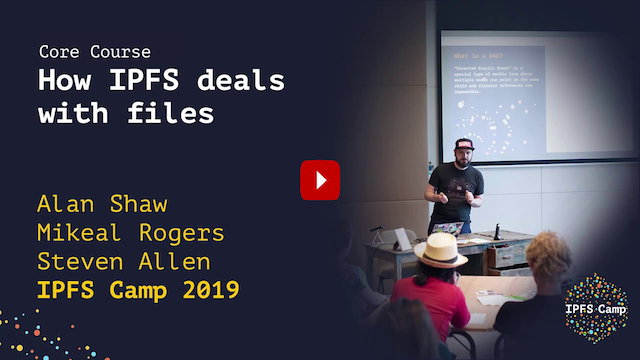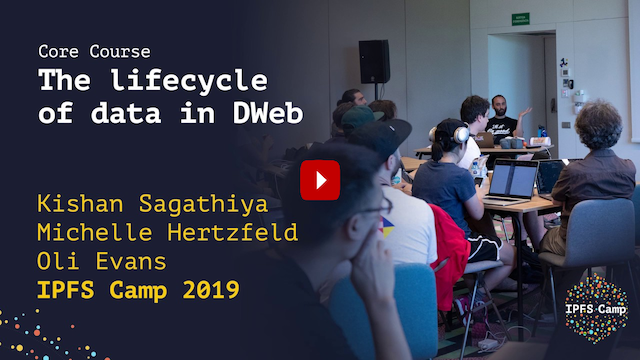If you've been following the updates from IPFS Camp here in the blog, you've likely already explored the videos from our lightning talks (opens new window), deep dives (opens new window), and poster projects (opens new window). Today we're excited to announce the release of the videos from our core and elective courses (opens new window)!
# Core Courses
Core courses at IPFS Camp served as the starting point to get all of us on the same page with a shared understanding of some the most essential concepts underlying IPFS. Elective courses covered even more ground, branching out into bleeding-edge DWeb topics, exciting use cases, and community endeavors. The format for these 75-minute courses varied, so you'll find app-building tutorials and interactive group discussions alongside cleverly diagrammed deep-dives and interpretive skits. There's something for everyone!
Check out the complete course listings (opens new window) in the IPFS Camp repo for links to videos, slide decks, and other workshop materials for each session.
Whether you're new to IPFS or looking for a deeper understanding of core concepts, we highly recommend these two core courses as your starting point. Both are easily consumable in video form -- no coding required -- and offer plenty of "aha" moments:
# Understanding How IPFS Deals with Files
This core course covers the basics of how IPFS deals with files, including key concepts like immutability, content addressing, hashing, the anatomy of CIDs, what the heck a Merkle DAG is, and how chunk size affects file imports. It also covers the joys and pitfalls of the Mutable File System (MFS), the layer of abstraction in IPFS that lets you work with immutable files and directories as if you were using a tradiitional name-based file system. As with all great talks, this one is enhanced by images of adorable poodles. 🐩 (12 / 10, would recommend.)
This workshop introduced a few awesome visualization and learning tools that you can try out at home:
- Explore the ProtoSchool tutorial on the Mutable File System (MFS) (opens new window) for coding challenges designed to familiarize you with its API
- Paste a Content Identifier (CID) into the CID Inspector (opens new window) to break down its anatomy
- Drag a file into the DAG Builder (opens new window) and adjust chunk size, DAG layouts, etc. to see how it affects the Merkle DAG
Watch the recording below or check out the slides (opens new window)!
Video: Understanding How IPFS Deals with Files (opens new window)
# The Lifecycle of Data in DWeb
This course covers all the stuff that happens after you add a file to IPFS, highlighting the intricacies of how peers interact with each other to provide, get, pin, and delete blocks of data. It explains the Distributed Hash Table (DHT) that helps us track which peers are storing which CIDs, as well as how Bitswap requests and sends blocks while verifying their data. No poodle pics here, but the live Bitswap dance using bean bags to model the block-sharing process is not to be missed! 🤹♂️
Watch the video below or check out the slides (available on Google Slides with speaker notes (opens new window) or as a PDF (opens new window))!
Video: The Lifecycle of Data in DWeb (opens new window)
# And more!
There are plenty more core and elective courses to explore in the latest batch of videos. Check out our full course playlist (opens new window) or jump right to the video that looks most interesting:
Core Courses
- Understanding how IPFS Deals with Files (opens new window) by @alanshaw (opens new window), @mikeal (opens new window), and @stebalien (opens new window)
- Solving Distributed Networking Problems with Libp2p (opens new window) by @jacobheun (opens new window), @bigs (opens new window), and @achingbrain (opens new window)
- Developing Apps with the IPFS API (opens new window) by @lidel (opens new window), @hugomrdias (opens new window), and @jimpick (opens new window)
- The Lifecycle of Data in DWeb (opens new window) by @olizilla (opens new window), @meiqimichelle (opens new window) and @kishansagathiya (opens new window)
Elective Courses
- Identity on the DWeb using IDM and Nomios (opens new window) by @satazor (opens new window), @paulobmarcos (opens new window), and @joaosantos15 (opens new window)
- Managing Pinsets with IPFS Cluster (opens new window) by @hsanjuan (opens new window), @lanzafame (opens new window), and @meiqimichelle (opens new window)
- Cat Roulette! Building a P2P Laser Catbot (opens new window) by @gorhgorh (opens new window)
- Deploying IPFS Infrastructure (opens new window) by @obo20 (opens new window) and @mburns (opens new window)
- Starting, Growing, and Stewarding your IPFS Community (opens new window) by @nukemandan (opens new window), @kk3wong (opens new window), and @stefanhans (opens new window)
- Building DApps with Textile, the iCloud for the DWeb (opens new window) by @balupton (opens new window), @carsonfarmer (opens new window), and @andrewxhill (opens new window)
- Managing Datasets with QRI (opens new window) by @b5 (opens new window)
Each of these courses has its own folder in the IPFS Camp repo, complete with course descriptions, slide decks, videos, code walk-throughs, or other materials provided by our awesome instructors. Check out the complete course listings (opens new window) for all the details.
# Explore related content in ProtoSchool
If you enjoy hands-on learning, set down that popcorn for a minute and try out a ProtoSchool tutorial (opens new window)! Or better yet, find a chapter near you (opens new window) and attend a live workshop. (Want to get really meta? Today's batch of videos includes an interactive workshop on leading interactive workshops (opens new window)!)
The ProtoSchool curriculum is growing, and we're excited to explore all of the fabulous IPFS Camp content to find gems to add to our tutorials. Watch this issue (opens new window) to track those content developments, or learn more about contributing to ProtoSchool (opens new window) as a tutorial author or chapter leader.
# But wait, that's not all!
There's even more great content from IPFS Camp content coming your way, including recordings of keynotes and interviews. If you're interested in receiving an update when the next batch of videos are available, try out one of these strategies:
- Watch and star the ipfs/camp repo (opens new window), where all the content will live.
- Subscribe to the RSS feed of this blog (opens new window).
- Subscribe to the IPFS Weekly Newsletter (opens new window) if you're interested in general IPFS updates.
- Subscribe to the IPFS Events Newsletter (opens new window) if you're interested in IPFS events.


